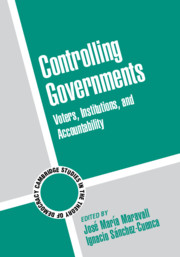Book contents
- Frontmatter
- Contents
- Acknowledgments
- Contributors
- Controlling Governments
- Introduction
- 1 Explaining the Electoral Performance of Incumbents in Democracies
- 2 How Can Governments Be Accountable If Voters Vote Ideologically?
- 3 Enduring Ethnicity: The Political Survival of Incumbent Ethnic Parties in Western Democracies
- 4 Performance or Representation? The Determinants of Voting in Complex Political Contexts
- 5 Political Knowledge and the Logic of Voting: A Comparative Study
- 6 The Political Consequences of Internal Party Democracy
- 7 Choosing Rules for Government: The Institutional Preferences of Early Socialist Parties
- 8 Constitutions and Democratic Breakdowns
- Author Index
- Subject Index
- References
2 - How Can Governments Be Accountable If Voters Vote Ideologically?
Published online by Cambridge University Press: 28 October 2009
- Frontmatter
- Contents
- Acknowledgments
- Contributors
- Controlling Governments
- Introduction
- 1 Explaining the Electoral Performance of Incumbents in Democracies
- 2 How Can Governments Be Accountable If Voters Vote Ideologically?
- 3 Enduring Ethnicity: The Political Survival of Incumbent Ethnic Parties in Western Democracies
- 4 Performance or Representation? The Determinants of Voting in Complex Political Contexts
- 5 Political Knowledge and the Logic of Voting: A Comparative Study
- 6 The Political Consequences of Internal Party Democracy
- 7 Choosing Rules for Government: The Institutional Preferences of Early Socialist Parties
- 8 Constitutions and Democratic Breakdowns
- Author Index
- Subject Index
- References
Summary
Introduction
There are two very different logics of voting, the logic of ideology and the logic of the incumbent's performance. A citizen may vote out of ideological closeness to parties or candidates, but the citizen may also vote in an attempt to discipline and control the government. In the first case, only ideological closeness matters. In the second case, ideology does not play a role, and the voter only takes into account the government's performance. The underlying rule in each case is clear. For ideological voting, the voter follows a decision rule that is based on ideological closeness: vote for the party that minimizes ideological distance. For performance voting, the voter follows a decision rule about reelection: vote for the incumbent if the utility produced by the government's policies is higher than a certain preestablished value; otherwise, punish the incumbent.
Of course, these two logics correspond roughly to the distinction between prospective and retrospective voting (Manin, Przeworski, and Stokes 1999). As Fearon (1999) has put it, under prospective voting, elections are a matter of selecting good types, whereas under retrospective voting, elections are a matter of sanctioning poor performance. This basic distinction can also be expressed in terms of the problem that each logic of voting produces: prospective voting is associated with adverse selection, retrospective voting with moral hazard (Ferejohn 1995).
Each logic of voting has been investigated by apparently self-contained literatures. Ideological voting is studied by spatial models, whereas performance voting is studied by accountability models.
- Type
- Chapter
- Information
- Controlling GovernmentsVoters, Institutions, and Accountability, pp. 45 - 81Publisher: Cambridge University PressPrint publication year: 2007
References
- 1
- Cited by

